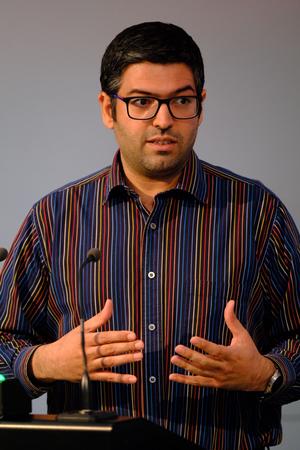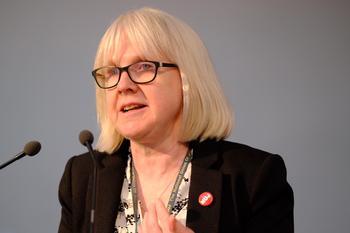DM2023: organisation
After more than a century the union voted narrowly to abolish the titles Mother of Chapel and Father of Chapel. Camilla Bracheshi supported a young member's seat on the Equality Council.

Proposing the motion, Behrang Tajdin of the Equality council, said it would form ‘a small step towards making the NUJ even more inclusive’.
It was aimed at making the union ‘a welcoming, modern trade union for all journalists and media workers, young and old, man, woman or non-binary, from these isles or those born elsewhere who now work here’.
Behrang said non-binary members in particular would be reluctant to put themselves forward for the posts of MoC and FoC. “Even if one person felt excluded, that is one person too many,” he told delegates.
He said the union should be proud of its history, but asked whether such terms would be used if the union were established today. The motion called for MoC/FoC to be replaced with "chair of chapel" in the rulebook.
“There is a broader issue here," he said. "We want, we need, more young people to join the union, to actively participate. Unfortunately many are not familiar with the role of trade unions, and when they hear terms like mother or father of chapel, they may find these gendered terms archaic, inaccessible, part of the language of an exclusive club from a bygone age, rather than a modern, inclusive body dedicated to fighting for them.
“Colleagues, we are all proud of our history and record as a union fighting against all sorts of discrimination and championing equality and inclusivity. We need to wear these values on our sleeves. Continuing to use gendered, exclusive, maybe even outdated terminology isn’t compatible with our values.”
He conceded that some delegates may be quite fond of the terms: “You have been using them for years, even decades. But I am sure you can see that they may sound strange to people who we want to join the union. There isn’t any need to have different terms for the most senior rep in a chapel based on their gender.”
However there was substantial opposition to the change, shown in the narrow 61 to 45 vote in favour.
Seamus Dooley, assistant general secretary, said the union should not discard such titles based on a ten minute debate on a century of history. If branches preferred the tiles of “rep” that was up to them.
Martin Shipton, Cardiff and South East Wales branch, said he had been proud of the title FoC, it meant there was a ‘nurturing’ element to the function. He said there should be consultations with chapels before such a decision was made.
In another debate about the organisation of the union, the London Independent Broadcasting and New Media branch tabled a motion which would have abolished the NUJ’s industrial councils, arguing that the lines between different forms of journalism had become blurred.
However the motion was withdrawn on the basis of an NEC statement agreeing to a root and branch review of the councils.
Under another resolution, the Equality Council constitution is to be changed to include a seat dedicated to a member aged 30 and under. The council’s remit will also be extended to include campaigning for the rights and welfare of young and early career members aged 30 and under. The motion also entitled the council to co-opt a developmental (student) member.

Sara Lewis, Equality Council, said that towards the end of last year, it ran two workshops for young and early career members.“The response was incredible with a wave of people signing up within days of the first one being announced,” she said.
“Clearly our members 30 and under are interested in the union and want to get involved, but it can take years to be well known enough so that people will elect you to office, especially on the Equality Council where seats are always hotly contested. “
She said the average age on the Equality Council was well over 40: “Under 30s are conspicuous by their absence, yet there is a maxim in equality work – not about us without us. How can we help them break through this barrier to get into office? By having a dedicated seat on the Equality Council for members up to 30, elected only by their own age group.
Sara said: “It will also mean that we can find at least one delegate for TUC Young Workers’ conference rather than simply opting out of this valuable opportunity for our younger members to develop trades union policy.
“Now on the Equality Council we have always considered young and early career members to be part of our remit and worked for example on improving access to training and recruitment. Yet we realised this vital part of our work has never been formalised and that needs to change.”
“And in another bid to secure the NUJ’s future we want to co-opt a developmental (student) member to the Council. These two posts are not just about the two young people who end up on the Council, but about the interest this will generate among other young members and potential members in the NUJ. We need young people to feel that the union’s elected officials and councils reflect them, and this is a major step for union democracy and its very survival in the future. Let’s welcome not ignore the TikTok generation.”
